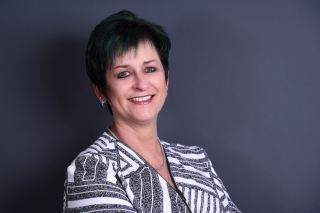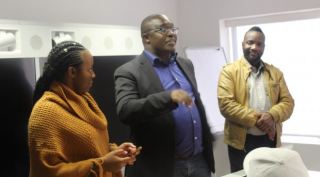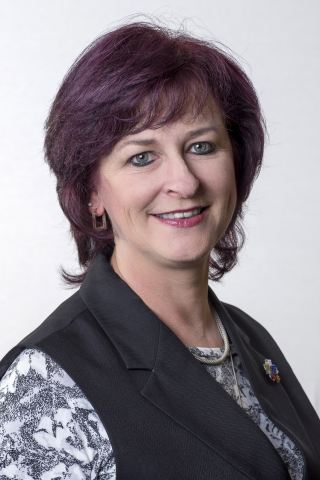Stop the Senseless Gender-Based Violence - Motor Industry Staff Association
The Motor Industry Staff Association (MISA) condemns in the strongest possible terms the scourge of gender-based harm so prevalent in our society and is calling on Government to act on the senseless and violent crimes committed against women in particular.
“We can no longer stand back and allow our country’s women to be discriminated against, harmed, harassed, abused, assaulted, raped and murdered as just another statistic in a country where self-enrichment seems to take preference over social justice and the basic human rights enshrined in our Constitution,” says Martlé Keyter, MISA’s CEO: Operations.
“We abhor all forms of violence, abuse and discrimination against any person regardless of their gender, sexuality, race or nationality.
“The time for idle and vague promises has passed. Decisive and strong leadership is required to eradicate gender-based harm,” says Keyter.
The trade union, which represents close on 50 000 employees in the South African retail motor sector, is pleading with Government for a normalised society in which everyone feels safe and secure.
“No woman should be threatened or at risk or be subject to cowardly violence. The State should now take the very real threat on the lives and livelihood of all women in South Africa seriously and implement measures that will restore the basic values so lacking in our disturbed society,” Keyter maintains.
“We are enraged by the harm that afflicts women in South Africa every day of the year. We condemn those who encourage gender-harm. We are appalled by the lack of political leadership and we deplore the physical, sexual, psychological or economic suffering inflicted on women.”
MISA says it is time to hold to account the perpetrators of gender-based harm, to change the attitudes, behaviour and culture of people in society that promote the culture of sexism and patriarchy.
For more information on MISA, visit www.misa.org.za
A New Attitude: UnStereotyping Advertising: Men should feel powerfully emboldened to be counted as feminists
As the Women’s Decade 2010-2020 of the African Union draws to a close, women the world over are standing firm in their push for gender equality – and they want men to walk and work with them, to change perceptions of how women are viewed, and implement changes right where they are. This is at the very core of the United Nations HeForShe campaign www.heforshe.org – a place where men can feel powerfully emboldened to be part of the movement and the solution.
The strides governments are making are laudable, says Anne Githuku-Shongwe, Representative at the United Nations Women South Africa Multi-Country Office. However, the real work of gender equality has to continually happen in our communities, in our thinking, in our advertising and our perceptions of women. “That’s what the United Nations HeForShe campaign is all about,” she says. “Taking personal responsibility and change that will cascade into thought and community change.” “With the advertising industry, we’ve created the Unstereotype Alliance, and we’re really challenging private companies who spend billions on advertising to make sure that every single advert that goes out does not stereotype or reinforce images of women as weak or as sexual objects, but actually promotes the image of the future that we really want, which is one where gender equality thrives,” explains Githuku-Shongwe.
The Unstereotype Alliance is a thought and action platform which uses advertising as a force for good to drive positive change. It seeks to eradicate harmful gender-based stereotypes in all media and advertising content. Convened by UN Women, the Unstereotype Alliance contributes to empowering women in all their diversity (including race, class, age, ability, ethnicity, religion, sexuality, language and education) and addressing harmful masculinities to help create a gender equal world.
The Loeries, the globally recognised awards for the advertising and communications industry across Africa and the Middle East, are Ally Members the Unstereotype Alliance. One aim is to engage with communications students through a dedicated Unstereotype Alliance and HeForShe Facebook Challenge http://bit.ly/2QLhbFL. “We really want students to engage themselves on the issue of stereotyping. If we can begin to impact on students who themselves are moving into this creative industry that shapes how we believe men and women should be in society, if we can start changing that, and every billboard that comes up, every ad that is on the table, imagine what that would do? A strong woman with a strong man, positive families. These are the images we want portrayed. And just one powerful ad can make such a difference.” “This is the kind of conversation that we want to have at Loeries Creative Week in August this year, with men who are not ashamed to promote feminism, and who can stand and be counted as a feminist.
We’ve got to impact everywhere there are influencers. Creatives are influencers, so if we can influence the influencers to influence the world, then we’re really influencing.” Anne Githuku-Shongwe explains that “in much of Africa and the Middle East, gender-based violence is normalised. It actually should be considered a state of emergency, the way you would deal with a cyclone or other disaster, because really there is a serious issue here. Rape in particular, and sexual violence, is prevalent in many countries, and it’s an area that really has to be dealt with because women will make progress in their education and in their economic advancements, but then they get into a situation of rape or some form of violence from a loved one, and all of that reverses,” she laments.
Gender equality has to go far beyond just the number of women who sit in high positions, it has to translate to having actual impact on women’s lives. Economically, governments spend billions on procurements every year. “Barely one percent of that goes to towards women-owned businesses. Barely! And that’s a global average,” says Githuku-Shongwe. “Just imagine if 50 percent of government procurement went to women-owned businesses? That would transform the world, because we know that women-owned businesses employ more people and impact on more people just because automatically they are households.
So the economic upliftment of women is not something to do just because it’s cute, it actually makes transformational economic sense. It’s good business actually. And it starts with changing the way women are viewed and treated.” Anne Githuku-Shongwe will be speaking at the Unstereotype Alliance Masterclass as part of Loeries Creative Week, 22-25 August. More info can be found at Loeries.com.
Major Partners: DStv Media Sales, Gearhouse
Category Partners: AB InBev, Barron, Brand South Africa, Facebook, Gagasi FM, Google, JCDecaux, Nando’s, Tsogo Sun, Vodacom, Woolworths
Additional Partners and Official Suppliers: AAA School of Advertising, Antalis South Africa, Aon South Africa, Backsberg, BEE Online, First Source, Fresh RSVP Guest Logistics, Funk Productions, Gallo Images, Grid Worldwide, Hetzner, Mama Creative, Newsclip, Paygate, Rocketseed, Shared Value Initiative, Shift Social Development, Vega School, VQI Communications Nigeria
Endorsed by: Association of Communication and Design, Brand Council South Africa, Commercial Producers Association, Creative Circle, EXCA, IAB, South African Institute of Architects, IID
Official Media Partners Bizcommunity.com, Book of Swag, Brand Communicator Nigeria, Business Insider by Pulse, Campaign Middle East, Film & Event Media, Modern Marketing,The Redzone. Twitter: @loeries Instagram: Loerieawards Facebook: The Loeries
Distributed on behalf of the Loeries by: Riana Greenblo Communications Date: June 27 2019 For more information, interview requests or high-res images, please contact: Riana Greenblo on 011 3256006; 0825675159 or This email address is being protected from spambots. You need JavaScript enabled to view it. McGloughlin on 0113256006 or This email address is being protected from spambots. You need JavaScript enabled to view it. (mornings only)
Cisco partners with locals for Girl Coding Initiative
Cisco Systems Inc, a global leader in Digital Business Transformation is on a mission to empower South African girls in ICT.The corporation has partnered with the Sibulele Sibaca Foundation, 1873FM, MathsGee and GirlsCode in its efforts to diffuse digital skills among school girls across the country. “We are very delighted to be partnering with Cisco in our quest to level the playing field in the ICT sector, we see equality and diversity as the pillars of success in product and market development for any serious organisation”, said Edzai Zvobwo, Chief Genius at MathsGee.
The 16th of July 2018 saw the partners converge on the Cisco offices in Bryanston, Johannesburg where 17 top performing high school girls were taken through an intensive one day conference on skills of the future and how to succeed in life as part of a 12 months ICT training under the Sibulele Sibaca Foundation. The renowned 1873FM disc jockey, WildFire gave an amazing talk to the girls on the need for more girls to code. He emphasized that app development should be motivated by a yearning to solve real life problems that the girls would have identified.
Zandile Keebine, a mathematician and computer scientist who as a young girl started GirlsCode reiterated on the fact that problems should be the foundation of app development. “Once you have identified a problem, take time to understand it and then come up with a solution for it, technology now allows us to imagine and turn those imaginations into products”, said Zandile.
Edzai Zvobwo stressed on critical thinking as a basis for idea generation and innovation. “You must look at the world and ask questions, do not just accept status quo, ask why things are the way they are”, insisted the Chief Genius.
The partners agreed that the day was a success and this intervention should go beyond the one day conference. The program should take the girls to a stage where they are digital skills wizards. It was agreed that these girls would form the first cohort for a six week program that will be hosted by MathsGee, publicised by 1873FM and GirlsCode will provide female mentors from various universities to inspire the girls.
Don’t Go Without Solid Policies in Your Organisation Part I: Gender and BEE
Part I: Gender and BEE
By Devan Moonsamy, CEO of The ICHAF Training Institute
A sound policy structure in the workplace is an insurance blanket against many common problems. It protects both employer and employee. But having a great policy will make no difference if personnel are not aware of it. They should be expected to know, understand and follow its guidelines and rules.
Not all employees have the time to go through policy documents, however, and it can be tedious reading. The best thing to do is to give employees a summary of the policy. They can be asked to sign in agreement with the policy, which will encourage them to get to know its provisions well.
What works even better is to train employees on the policy, for example, by putting them through a workshop. This need not be a dreary affair. In fact, it can be really fun if approached in the right way and if it focusses on how the policy benefits the employee. The right facilitator can ensure staff understand, but don’t feel overburdened by the new policy provisions.
This is a very effective preventative measure which ensures employees know exactly what is expected of them and what their rights are.
People often focus a lot on what went wrong, especially reactively after a problem arises, such as a nasty incident between co-workers. But telling staff what they can and should be doing at work beforehand is more effective than just giving them a long list of what they can’t do. This helps them focus on being productive and getting along rather than worrying about how they might slip up.
Teaching and emulating good behaviour is also vital. Management sets the standard of behaviour. Employees never know everything they need to when starting a new job. There’s always things to learn, and it is extremely effective when one is taught the right behaviour as early on as possible.
The policy document itself is a critical backup. Staff members trained on key organisational policies can more firmly be held to account. If it’s in writing and it’s the company’s official stance on the matter, it makes it easier to handle problems in a mature, organised way. Risk Management planning has already been conducted and communicated by means of drafting and disseminating the policy, and training staff on it.
When staff are properly educated and trained, it greatly eases management’s concerns over their behaviour. What kinds of policies are important to have in place for South African businesses? In this first article we will look at two critical policies to create and train your employees and co-workers on.
Gender Equity Policy
The plight of women and girls in South African is an open secret. Everyone knows it is happening, but it remains well hidden. Nevertheless, the facts speak for themselves: women and girls are often in a difficult and subordinate position. They may have little say over their salaries, which jobs are open to them, and even over their very bodies.
Google recently got into serious trouble over pay inequities between male and female employees. The problem is severe enough that the US Department of Labour filed a lawsuit. Google tried to gloss over the problem, but experts quickly identified weaknesses in its approach, particularly in that it left out 11% of employees in an official gender-pay analysis.
PR Risk Management must not wait for disaster to strike. It can happen now by having good provisions in place which prevent these kinds of injustices. South African companies likewise must practice equal pay and benefits for equal work to redress the wrongs of the past.
Women also need to have an equal chance of being hired, promoted and trained. Women should not be seen as only fit for and kept in positions of ‘admin lady’ or ‘maid’. They must be invested in because they make great workers and very strong, effective and just leaders.
Women need to be heard in meetings, and they shouldn’t be expected to work harder than men just to be noticed or stuck under a glass ceiling. All this must be addressed in a gender equity policy document which HR and other staff members are well versed in and follow closely.
BEE Policy
This one goes without saying in South Africa, but staff do still need to understand what the company stance is with regard to BEE and why, and they must be monitored in following it. As Brand South Africa explains, ‘Black economic empowerment (BEE) is not simply a moral imperative... It is a pragmatic growth strategy to realise the country’s full potential by bringing the black majority into the economic mainstream.’
Various BEE provisions should be contained in the HR and recruitment policy, and the procurement policy. These include prioritising people of colour as much as possible in hiring, promotions, and buying decisions. A whole lot of black workers and a few white managers is still seen in some businesses. This must be addressed in binding policy to commit the company to equity measures. What specific BEE provisions do South African organisations have in place? A few helpful examples are given below.
Ithala Development Finance Corporation has in its BEE policy the provision that some contracts be sub-divided. This opens opportunities for black-owned SMMEs which may not yet have sufficient resources and staff to offer the most comprehensive services.
The Department of Trade and Industry emphasises that there must be active participation by black people in an enterprise for it to be considered as really following BEE principles.
Barclays Africa explains that it actively invites black-owned suppliers to participate in sourcing procedures. This has successfully helped the company to engage in business with more BEE companies.
NMMU’s policy makes BEE a key function of all managers. The University also measures the successful implementation of BEE in its employee performance assessments.
Tembeka Ngcukaitobi from Bowman Gilfillan notes that there is ‘No empowerment without skills.’ Skills development for all staff should be included in policy to meet BEE requirements.
The Shoprite Group/Checkers takes a very proactive approach by assisting new suppliers with creating barcodes and packaging so their products can be sold in stores. Every five years the employment equity plan is reviewed, and new targets are set to guide progress.
As a public company, Murray & Roberts has worked on its shareholder diversity, which now includes 59.53% black shareholders and 17.13% black women shareholders.
Besides these two key policies, companies should draft a disability policy, harassment and abuse policy, and have a training policy in place as well. We will look at these policies in detail in my next article on this topic. The organisational values, mission and goals are also commonly found in the first policy documents drafted, but don’t stop there. Draft additional policies with management input so as to protect the company and its employees. Proactively disseminate the most important policy messages using posters, emails, awareness drives, workshops, and training.
ICHAF is a training provider with years of experience in upskilling staff. We are ideally placed to conduct workshops and educate your staff on policies that will benefit all involved and protect the company from many PR and labour-related risks. Let us show your staff the way to boost their career and the company’s image through best practice policies.
For more information about training your staff:
Website - http://www.ichaftraining.co.za/
Facebook - https://www.facebook.com/TheICHAFTrainingInstitute/?ref=br_rs
Twitter - https://twitter.com/TheIchaf
For further comment from Devan Moonsamy you can email him on This email address is being protected from spambots. You need JavaScript enabled to view it. or contact him on 083 303 9159
Motor Industry heavyweights announce important business transformation initiatives
Two major role-players in the South African motor retail industry – the Retail Motor Industry Organisation (RMI) and the Motor Industry Staff Association (MISA) – today announced two important business transformation initiatives in the South African retail motor industry.
The two organisations that carry considerable weight in the motor retail industry (the RMI, with more than 7 500-member businesses, is the leading collective voice of the retail motor industry in South Africa, while the fast-growing and dynamic MISA, with its well over 43 000 members, is the only union that focuses exclusively on the retail motor industry) have pledged their strong commitment to address two pressing issues in the industry: creating more job opportunities for people with disabilities and achieving greater gender equality.
Equalising the gender playing field
The two organisations have agreed to work together to equalise the gender playing fields in what is still a predominantly male-dominated industry, while also attracting and retaining more people with disabilities to this important economic sector.
Issues on the agenda include redressing the inequalities of power that exist in the areas of decision-making and representation, the differences in legal status between different genders, eradicating violence against women in the industry as well as the discriminatory attitudes that still prevail, while achieving an increased participation of women in the labour market.
“No one should be subject to gender discrimination or harassment,” says Martlé Keyter, MISA’s CEO Operations.
RMI CEO, Jakkie Olivier, notes, “As the RMI, we are committed to invest more effort into ensuring gender issues are addressed in collective bargaining and promoting the equal treatment of all employees.”
The two organisations have joined forces with various industry employers and have also already enlisted and trained a team of industry representatives who will champion the two initiatives going forward.
Job creation
According to MISA’s CEO for Strategy and Development, Hermann Köstens, the motor retail industry can play a significant role in creating jobs for people living with disabilities, with a specific focus on young workers.
“With 48 000 jobs lost in South Africa in the first quarter of this year, we as an industry must step up and do whatever we can to stimulate job creation,” he notes. “One way in which to do this is to create more opportunities for people with disabilities and to retain them in our industry.”
Keyter agrees, “We would like to see employers make a mind-shift towards focusing on what people living with disabilities can contribute to the workplace, rather than focusing on what they cannot do.”
“We are strong campaigners that persons with disabilities who want to work, must be given the opportunity to do so if they possess the inherent qualities the job requires,” concludes Olivier.






